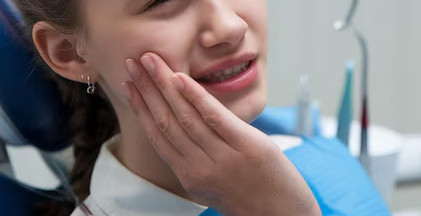We recognize the impact and urgency of dental injuries, not just for your oral health but for your overall well-being. Whether it’s a sports injury, an unexpected fall, or an accident, the repercussions on your teeth can be significant.
Understanding the types of dental injuries and their causes, prevention strategies, and treatment options can make all the difference in preserving your smile and preventing long-term complications.
Dental injuries encompass a range of issues, from minor chips to severe trauma, including avulsion, where a tooth is completely knocked out. The urgency and method of dealing with these injuries vary, but the importance of seeking immediate dental care cannot be overstated. Prompt action can often save a tooth and prevent further damage or long-term health issues.
Types of Dental Injuries
- Cracked Teeth: These can vary in severity from minor surface cracks to deep fractures extending into the root. Immediate care includes rinsing the mouth with warm water and applying a cold compress to reduce swelling.
- Chipped or Broken Teeth: Symptoms may include pain, sharp tooth edges, or minor bleeding. Emergency steps include saving broken pieces and rinsing the mouth with warm water.
- Avulsed (Knocked-Out) Teeth: If a tooth is knocked out, handling it by the crown, rinsing it without scrubbing, and attempting to reinsert it into the socket is critical. If reinsertion isn’t possible, keep the tooth moist in milk until you can get professional help.
- Dental Intrusion (Teeth Pushed into Jawbone): This less common but serious injury requires urgent dental treatment to prevent complications, including damage to the tooth’s ligament and pulp.
Causes of Dental Injuries
Common causes include:
- Sports injuries: High-impact sports without protective gear can lead to dental trauma.
- Accidents and falls: Unexpected impacts can crack, break, or knock out teeth.
- Biting on hard objects: Ice, candy, and other materials can cause teeth to chip or break.
- Vehicle accidents: Collisions can result in severe dental and facial injuries.
Preventive Measures
Prevention is key to avoiding dental injuries:
- Use of Mouthguards in Sports: Essential for protecting teeth during physical activities.
- Safety Measures: Implementing safeguards at home and work to prevent falls and accidents.
- Caution with Eating: Avoiding hard or sticky foods to prevent unnecessary stress on teeth.
Treatment Options
Treatment varies based on the injury:
- Emergency Treatment Steps: Immediate care to control bleeding, reduce pain, and protect the injured area.
- Professional Dental Procedures: Depending on the injury, treatment may include bonding, crowns, root canals, or, in severe cases, extraction.
- Follow-up Care and Monitoring: Essential to ensure healing and function are restored.
Complications of Untreated Dental Injuries
Neglecting dental injuries can lead to:
- Risk of Infection: Open wounds or exposed nerves can become infected.
- Potential for Further Dental Damage: Without treatment, a minor injury can lead to significant damage or loss of the tooth.
- Long-term Oral Health Issues: Untreated injuries can affect the injured tooth and surrounding teeth and oral health.
FAQs About Dental Injuries
- Do all dental injuries require immediate medical attention? It is best to seek professional care for any dental injury, even if it initially appears minor.
- What should I do if a tooth is knocked out? If possible, gently rinse the tooth with water and attempt to reinsert it into the socket. Place the tooth in a cup of milk and seek immediate dental attention if impossible.
- Can I prevent dental injuries? While some accidents are unavoidable, using proper safety equipment during physical activities and being cautious when eating hard or sticky foods can help reduce the risk of dental injuries. Maintaining good oral hygiene habits is also important to keep teeth strong and healthy.
- Should I be concerned if a dental injury doesn’t hurt? Yes, even if there is no pain, any damage to the teeth or surrounding tissues should be evaluated by a dentist. Delaying treatment can lead to further complications and potential long-term oral health issues.
- Is it necessary to see a specialist for a dental injury? Depending on the severity and type of injury, your regular dentist may refer you to a specialist, such as an endodontist or oral surgeon, for specialized treatment.
- How long does it take to recover from a dental injury? The amount of time it takes to recover from an injury depends on its kind and severity, but getting medical help quickly might speed up the process. Getting medical help right away is essential for a speedy and proper recovery.
- What should I do if I experience a dental injury while traveling? It is important to seek care from a local dentist or emergency room immediately. If you cannot find immediate help, follow the steps for managing a dental injury at home and schedule an appointment with your regular dentist upon returning home.
- Are there any long-term consequences of not seeking treatment for a dental injury? Ignoring a dental injury can lead to permanent damage and potential risks for infection. It is important to seek treatment from a professional as soon as possible to prevent further complications.
Rapid Relief: Restore Your Smile After Dental Injury with Palmetto Family and Cosmetic Dentistry
Dealing with a dental injury? Let us guide you towards a swift recovery and rejuvenated smile. Our experienced team is dedicated to providing effective solutions for dental injuries, ensuring your comfort and confidence.
Get in touch right away to set up your consultation and start the process of improving your dental health.

